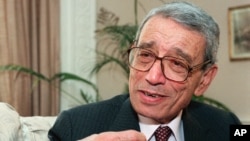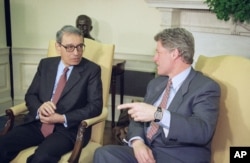Former United Nations Secretary-General Boutros Boutros-Ghali has died at the age of 93.
Boutros-Ghali, a veteran Egyptian diplomat who helped forge his country's peace agreement with Israel, was the U.N.'s sixth secretary-general, serving from 1992 to 1996.
His U.N. tenure was marked by several climactic world events -- the collapse of the Soviet Union, the end of the Cold War, the emergence of the United States as the single global military power and violent humanitarian crises in Africa and the Balkans.
U.N. Secretary-General Ban Ki-moon paid tribute to his predecessor, recalling that Boutros-Ghali had led the world body during "one of the most tumultuous and challenging periods in its history" and presided over "a dramatic rise in U.N. peace-keeping" missions around the globe.
But Boutros-Ghali's five years at the helm of the U.N. remain controversial, remembered for his clashes with the United States, which ultimately blocked a second term for him as secretary-general, making him the only single-term U.N. chief. He was replaced by Ghanian Kofi Annan in 1997.
Critics of Boutros-Ghali blamed him for his role in failing to prevent the 1994 massacre in Rwanda, in which a half million Tutsis and moderate Hutus were killed in 100 days.
Indeed, years later, Boutros-Ghali called the massacre "my worst failure at the United Nations."
But he blamed the United States, Britain, France and Belgium for paralyzing U.N. action by setting impossible conditions for intervention. The U.S. president at the time, Bill Clinton, and other world leaders opposed sending U.N. peacekeepers to the tiny Central African nation or intervening to stop the massacres, although Clinton later acknowledged that he regretted the lack of intervention.
After leaving the U.N., Boutros-Ghali, in his writings, accused Washington of using the U.N. for its own purposes.
In his 1999 book, Unvanquished, Boutros-Ghali wrote that he "mistakenly assumed that the great powers, especially the United States, also trained their representatives in diplomacy and accepted the value of it. But the Roman Empire had no need for diplomacy. Neither does the United States."
Boutros-Ghali died in a Cairo hospital where he had been admitted several days ago after suffering a broken pelvis.
Some material for this report came from AP and AFP.










